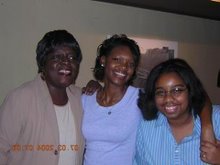I was watching and reading archive material from "The Tavis Smiley Show," when I came across a February 2007 interview with Dr. Cornel West. Smiley, who has interviewed West on numerous occasions, engaged deeply with the Princeton University professor as they talked one-on-one. In this particular interview, Smiley asked West about the legacy of Dr. Martin Luther King Jr. West referenced King's ideologies . According to West, King's greatness separated him from the status quo. West alluded to his message of love and humanity, forgiving and service, decency and companionship for all. However, West said King was just a man, who depended on many to fulfill his purpose of greatness - eradicating social injustices.
That led me to ask: What does it mean to be great? Some nights, I find myself tossing and turning, repeatedly thinking, "What can I do to better myself and my people's conditions?" According to West, there are two critical things one must do to achieve greatness. One, he said individuals must think for themselves. They must cut against the grain of their peers and develop their own thoughts. Second, individuals must develop their own "habitual vision of greatness." This is, the nagging thoughts, that pull at you, to do more, to be more, in a society dominated by white supremacy, racism and discrimination.
As West poignantly said, "You have to believe in fact that you will refuse to settle for mediocrity. You won't confuse financial security with your personal integrity. You won't confuse your success with your greatness or your prosperity with your magnanimity. If you have a vision of greatness as something that's luring you all the time for something grander than you and, of course, as a Christian, for me, he who is great will be" a servant.
Those who are familiar with Cornel West know that his message is one of faith and love, not hatred. That's why his messages permeate among the masses. Although I had listened to this interview before, his words struck a cord with me again due to a recent class discussion.
As a student, I questioned the statement of a professor, who recently said it was okay for minorities to hate the oppressor. In essence, she said it was okay for the oppressed to hate the oppressor. She referred to white people as the oppressor. I agree that there are certain ills that plague our society, of which people should question and protest against the unjust nature of the status quo. That's what my ancestors did. That's what Martin and Malcolm, Huey P. Newton and Angela Davis did. They protested and fought against a racist society. They did so because they loved the people that they were fighting for.
However, as a Christian and as a product of my ancestors, I believe it is wrong to hate. Hatred is a form of cowardliness and insecurity! For it was the power of love and forgiveness that caused black people to march on Southern domains, consistently agitating for freedom repeated times. It was the power of love and forgiveness that gave my ancestors strength and courage while they were shackled in bondage and treated as chattel, property. Love and forgiveness are the abstract shields that protect me as I traject through a society filled with social ills. I would not be in my current position if my ancestors hated those who hated them. When someone hates you, you must have the power to forgive them, as Nelson Mandela said.
Hate is the one thing that can internally destroy a human being. I find that white radicals (who claim to be down for the cause) are quick to protest using hateful tactics, having had no experience living in blackness. They say "All Power to the People," and preach a message of hate, having not survived years of racism, white supremacy and discrimination like my black brothers and sisters. Their actions are unacceptable and warrant disrespect from myself and other minorities alike.
I hope the professor, who made the comment I referenced, reads this blog. After reading the words of Dr. Cornel West and re-analyzing the thoughts and actions of historical black leaders, she will then see that, "Love and justice is a serious thing in a world that's obsessed with fear, hatred and greed."
Salaam,
E. Tanille
Saturday, April 14, 2007
Subscribe to:
Post Comments (Atom)

1 comment:
Post a Comment